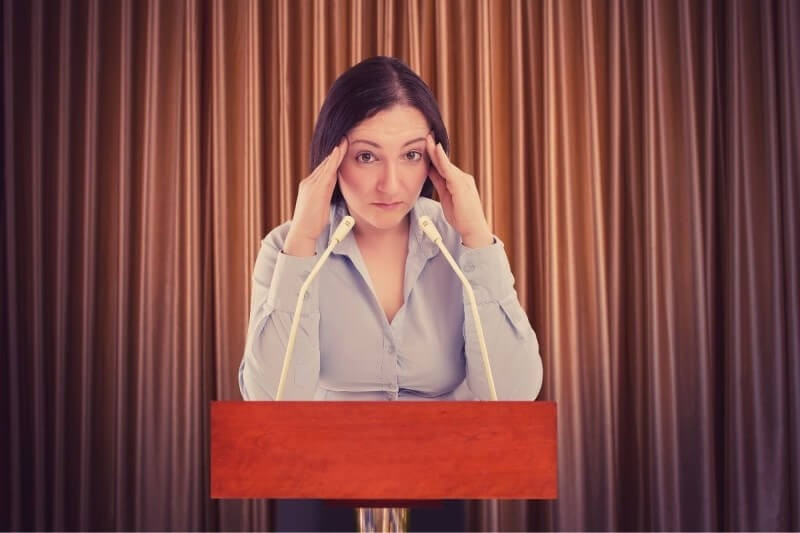VIRTUAL EMDR BLOG
Can EMDR Help You Overcome Your Fear of Public Speaking?
Fear of public speaking, or glossophobia, is among the biggest fears faced by many people. EMDR can help.
14 May 2021
![]() Tag: Anxiety
Tag: Anxiety

Imagine if you had to stand up on stage and perform in front of a critical audience. Or, what if you were asked to make a career-defining presentation to your boss? Or maybe you were suddenly called on at a party and asked to make an impromptu speech?
For many people, just the thought of having to perform or
speak in public is enough to send jitters down your spine.
Even people who are otherwise confident and competent are not immune from experiencing paralyzing fear, nightmares, sleepless nights, anxiety, sweaty palms, and racing hearts. By some estimates, one in four people suffer from glassophobia, or fear of public speaking.
Why is Public Speaking so scary?
Why is public speaking so terrifying to many people? According to research, there are 4 common reasons behind this phobia:
1. Lack of experience
For most of us, we rarely get the opportunity speak or perform in public, unless you are a celebrity, performing artiste, sales person, or senior leader. In fact, most people can remember clearly every single occasion when we get to speak in front of large crowds or go on stage! Like all skills, public speaking gets easier and more natural the more practice we get. However, the lack of experience means that for most of us, public speaking remains an unfamiliar and difficult task that we dread.
2. High perceived risk
Added to the lack of experience is the high perceived risk of public speaking. Your audience often includes people whom you look up to, such as your boss, teachers, peers, or invited guests. It is only natural that you want to impress them.
This creates more internal pressure within you, as the consequences of failure are high. If you do a bad job, you could lose status in their eyes. What if they start to think of you as incompetent, dumb, bigoted, or a fraud? You could lose your chance at a promotion, get passed over for plum opportunities, or even excluded from social events! Not to mention the fear that your friends and colleagues may start snickering or talking behind your back.
The perceived risk gets higher if you are being evaluated by a panel of judges, examiners, or speaking to experts or a highly-critical audience. Just the knowledge that your every move is being closely watched and judged greatly adds to the stress and fear you already feel.
3. Negative self-belief
Ask most people about public speaking, and the reaction you get is likely to be along the lines of “I hate public speaking”, “I am afraid I’ll forget what to say”, “I’m just so bad at it”, or “I’m so boring, no one wants to watch me”.
Unfortunately, these negative self-beliefs are self-perpetuating. As Henry Ford famously said, “Whether you think you can or think you can’t, you’re right”. Mentally putting yourself down even before you’ve started, well, usually keeps you down.
4. Fear of fear
The fear and anxiety that most people experience around public speaking is a very real physiological event. When confronted with a perceived threat, our bodies prepare for battle. Our nervous system automatically becomes aroused, and this hyperarousal is what leads to the emotional experience we label as “fear”.
Even experienced public speakers admit that they still feel that certain tingling in their bodies, heart racing, or blood pounding sensation before they step on stage. These physiological symptoms of “fear” never go away – it’s just that their confidence and experience help these experts to manage it better.
For other mortal beings, we may experience “fear of fear”, or anxiety sensitivity. Anxiety sensitivity means that in addition to being worried about public speaking, we are also worried about our anxiety about public speaking. This double-whammy compounds our fear, making us even come across as nervous, unconfident, or even physically shaking, when put under the spotlight.
Three simple things you can do
Luckily, there are simple steps that you can take to overcome your fear of public speaking. Here are three easy things you can do – even starting right now.
1. Practice, practice, practice
Hey, did you know that no one was born a good public speaker? That’s right, as far as we know, all babies are born with the same public speaking ability, which is none, zilch, nada. Public speaking is a skill that everyone has to learn from scratch.
This means that you too can get better, with the right practice. Since lack of experience is one of the four reasons driving fear of public speaking, build your experience by seeking out opportunities to speak and perform in public.
Join a Toastmasters or public speaking club in your school or neighborhood. There are even clubs that meet virtually. At work or school, raise your hand at every opportunity to speak in front of small groups – and gradually work up your confidence to get in front of larger crowds and paying audiences.
At home, rehearse speaking in front of the bathroom mirror, pretending that you’re talking to an audience. Professional speakers, stand-up comedians, and performers say that they practice a lot more than their audience realize – paradoxically, the more you practice, the more natural and unrehearsed you’ll come across!
In this age of social media, do video-record yourself… and post the videos online. Wait, you don’t feel “ready” or good enough? Think again! Did you know that expert YouTubers and TikTok stars all thought the same thing? They too believed that they weren’t “ready” to post that first video. In fact, they admit that their first videos were embarrassing and cringe-worthy – but luckily few people watched them! Nevertheless, without that first video, there wouldn’t have been a second, or a third – you get the idea.
2. Win the Mental Game: Communicating vs Performing
Follow Henry Ford’s sage advice and begin thinking “I can do it!”. If you want to say something to yourself, why not choose an empowering mantra? Tell yourself: “I am a good public speaker”, “I am getting better every time”, “I enjoy public speaking”, ““If anyone can do it, so can I!”
One invaluable tip is to start thinking of public speaking as “communicating”, instead of “performing”. What’s the difference, you ask?
Well, when you think of public speaking as “performing”, you see it as something that requires special skills. You also see the audience as judges who are evaluating your performance and grading how “good” or “bad” you are. This adds to the pressure and anxiety that you feel.
In contrast, thinking of public speaking as “communicating” means that you simply this as another forum to communicate your ideas or tell your stories, no different from a normal everyday conversation that you have with friends. During these conversations, you are typically not focused on whether you are performing “well”, but instead on whether you are communicating your ideas effectively and clearly.
So the next time you’re in front of an audience, think of “communicating” – instead of “performing”!
3. Move past the past
Do you have a traumatic memory of public speaking or performing? Many people do. Maybe you have a memory of forgetting your lines on stage, dancing out of step, hearing the audience snicker, or being criticized for your performance.
Well, you are not alone. Take Jason’s story – he writes, “For years, I was afraid to speak up in public because I kept remembering the first time my performance was criticized. It was so distressing. I began to doubt my own abilities, I thought my ideas were not good enough.”
Finally, Jason decided it was time to stop being held back by his fear of public speaking. He researched and came across a treatment called EMDR, which was effective in overcoming traumatic memories.
Jason recalls, “Using EMDR helped me to process the memory of my performance being criticized. As I was processing it, new explanations of what happened popped into my head. I felt my distress melt away. I replaced my negative associations with new positive affirmations, giving me new confidence and self-esteem in public speaking.”
Using EMDR to overcome fear of public speaking
So what is EMDR?
EMDR stands for Eye Movement Desensitization and Reprocessing. Approved by the World Health Organization (WHO), this trauma therapy has been scientifically-proven to help people overcome traumatic memories. Initially tested on PTSD sufferers, including combat veterans, it has also proven to be effective on anxiety, fear, phobias, and even public speaking.
EMDR works by stimulating natural human memory processing, allowing your brain to access and re-process the traumatic memory. You are able to explore negative feelings and physical reactions associated with that memory, and then replace it with positive associations such as calmness, confidence and self-esteem.
For example, you may currently associate “public speaking” with negative self-talk such as “I’m going to make a fool of myself”, or feeling overwhelmed or panic. Using EMDR, you are able to replace these with positive messages such as “I am helping other people by speaking out” or feeling confident and inspired.
Experience the Power of EMDR with Virtual EMDR
Now, you can experience the power of EMDR in the privacy of your home – starting right now! Virtual EMDR is the #1 online self-guided EMDR program which has been used by over 10,000 people to treat anxiety, fear, trauma, stress, and more. Developed by neuroscience experts, this interactive program is easy- to-use – and available anytime you need help.
Try it completely free for 3 days – and begin to overcome your fear of public speaking today.
“I started the session feeling shameful feelings of inadequacy and incompetence.
I ended the session with laughing and laughing…until I was crying about how ridiculous all the pressures I place on myself!"
- Wendy W, Virtual EMDR customer
LIMITED TIME OFFER: Use Promo code “HEALING10” for 10% off your first month of Virtual EMDR. Click here to start your free 3-day trial.
Be the first to comment.









View Comments